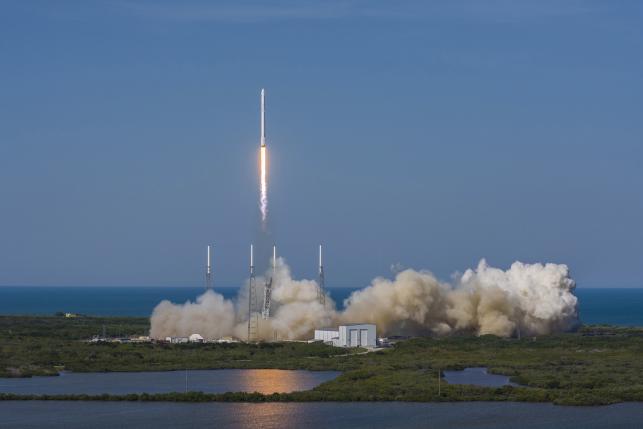SpaceXrocket booster makes breakthrough landing at sea

A SpaceX Falcon 9
rocket blasted off from Florida on a NASA cargo run to the International Space
Station on Friday, and its reusable main-stage booster landed on an ocean
platform minutes later in a dramatic spaceflight first.
The successful autonomous touchdown of the booster at sea marked another milestone for billionaire entrepreneur Elon Musk and his privately owned Space Exploration Technologies in the quest to develop a cheap, reusable rocket, expanding his edge in the burgeoning commercial space launch industry.
The liftoff at 4.43 p.m. EDT (2043 GMT) from Cape Canaveral Air Station also marked the resumption of resupply flights by SpaceX for NASA following a launch accident in June 2015 that destroyed an earlier cargo payload for the space station.
About 2 1/2 minutes after Friday's launch, the main part of the 23-story tall, two-stage SpaceX rocket separated, turned around and headed toward a landing platform floating in the Atlantic about 185 miles (300 km) northeast of Cape Canaveral.
A live video feed broadcast on NASA television showed the rocket booster, its four landing legs extended, descending over the ocean before settling itself upright on the barge-like platform, roughly eight minutes after launch.
“The rocket landed
instead of putting a hole in the ship or tipping over,” Mr. Musk told reporters
at the Kennedy Space Center a
short time later. “We're real excited about
that.”
Four previous at-sea landing attempts had failed. But a Falcon 9 main-stage rocket achieved a successful ground-based touchdown in December, the first ever during an actual commercial space mission.
U.S. President Barack Obama hailed the latest accomplishment on Twitter, saying, “Congrats SpaceX on landing a rocket at sea. It's because of innovators like you & NASA that America continues to lead in space exploration.”
SpaceX plans to plans to start launching rockets about every two weeks from its sites in Florida and California later this year as the company tackles satellite-delivery orders worth some $10 billion, company officials said.
Roughly half the upcoming missions will leave the Falcon 9's booster with too little reserve fuel to fly all the way back to the launch site for a return landing, so the ability to land at sea is essential, Musk said.
He estimates each Falcon 9 booster should be good for 10 to 20 launches, possibly up to 100 with minor refurbishment.
SpaceX also plans to debut a heavy-lift version of the Falcon rocket this year, equipped with 27 engines powering its first-stage, compared to the nine currently used.
AIMIM News
Latest Urdu News
Most Viewed
Do you think Canada-India relations will improve under New PM Mark Carney?

.jpg)









.jpg)
.jpg)
.jpg)
.jpg)
.jpg)
.jpg)
.jpg)
.jpg)
.jpg)
.jpg)
.jpg)
.jpg)
.jpg)
.jpg)

















